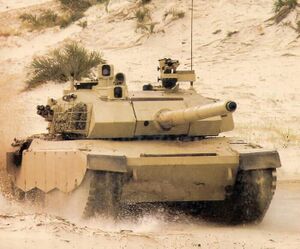Sundarji
| Sundarji | |
|---|---|
 Sundarji | |
| Type | Main battle tank |
| Place of origin | Tennai |
| Production history | |
| Designer | Kalpa Defense |
| Designed | 1980 – 1986 |
| Manufacturer | Kalpa Defense |
| Unit cost | ₹5.044 million(NS$3.8 million) |
| Produced | 1986 - 2000 |
| No. built | 3,500 |
| Specifications | |
| Weight |
|
| Length | 9.99 metres (32 ft 9 in) |
| Width | 3.26 metres (10 ft 8 in) |
| Height | 2.37 metres (7 ft 9 in) |
| Crew | 4 (commander, gunner, loader, driver) |
| Armor | modular composite armor |
Main armament | Kala H1 120mm smoothbore gun (38 rounds Sundarji 1A, 42 rounds Sundarji 1B) |
Secondary armament |
|
| Engine |
|
| Power/weight |
|
| Transmission | Kalpa MT1500 automatic transmission |
| Suspension | hydropneumatic |
| Fuel capacity | 1,300 liters |
Operational range | 550 km (340 mi) |
| Speed | 70 km/h (43 mph) on the road 55 km/h (34 mph) on all-terrains |
The Sundarji is a Tennaiite main battle tank developed by Kalpa Defense.
Design
Defense
The Sundarji tank is fitted with Kanchal composite armor. It includes steel, aluminum, carbon fibers and ceramics. The adoption of modular composite armor design facilitates the upgrading and exchange of the armor. The level of protection is high, and the front of the turret and front of the hull do not penetrate DM33 KE ammunition fired from close range, and do not affect the interior of the vehicle. The Sundarji has automatic fire suppression and NBC protection systems.
Armament
The Sundarji , is armed with a Kala H1 120 mm smoothbore gun, and carries a total of 38 rounds of ammo for it. It fires APFSDS, HE, HESH, HEAT, APERS, WP, and canister rounds. The Sundarji’s gun is fully-stabilized and manually loaded. The Sundarji main battle tank has a hit probability of 80% at 2 km range against moving target. Secondary armament of the Sundarji consists of two 12.7 mm machine guns. One of them is mounted coaxially, while another is placed on top of the roof.
Since its introduction there have been several upgrades to the fire-control system, including the addition of a Yttrium-Aluminium-Garnet laser rangefinder with a range of 300 to 5,000 meters, a 32-bit ballistics analysis computer, improved thermal imaging and Automated-tracking systems, and improved gun stabilization. The FCS also has an automated tracking system, and is capable of engaging moving or stationary targets while moving in day or night. The automatic target tracking system uses a thermal image display which can be controlled by either the tank gunner or commander. It is capable of tracking soldiers, vehicles and helicopters. The targeting computer can also calculate lead on moving targets. Hit probabability increased to 90% against moving targets.
The commander's sight consists of a 3× / 10× (day and night sight). The sight can track vertically from -29 to +29 degrees, as well as track horizontally through 180 degrees. The gunners sight has a 10 x zoom.
Engine
The Sundarji main battle tank is powered by a Kalpa 10ZG 10-cylinder, two-stroke cycle 1,500hp/2,400 rpm diesel engine. It is coupled with the Kalpa MT1500 automatic transmission (4 forward gears, 2 reverse gears). Engine and transmission are mounted in a single block and can be replaced within 30 minutes in field conditions. There is also an auxiliary power unit, which powers all systems, when the main engine is turned off. The Sundarji has a Ratheepa hydropneumatic suspension system.
Variants
- Sundarji 1A - Initial production model
- Sundarji 1B - Upgraded variant featuring a new Kalpa 10ZH 1,600hp engine, improved gun stabilization, increased armor, and a number of other improvements.